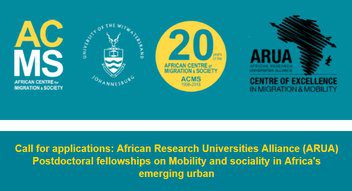Application Deadline: midnight, 1 May 2019.
The African Research Universities Alliance (ARUA) is seeking post-doctoral fellows to join a five year research programme entitled ‘Mobility and Sociality in Africa’s Emerging Urban.’ This initiative is a scholarly response to unprecedented levels of urbanisation and mobility driven by conflict, ambition, and respatialising economies. It is intended to develop African-based contributions to theories of human mobility and transforming modes of social engagement, authority, representation and expression.
This initiative brings together five African Universities dedicated to cultivating a generation of African scholars who can reshape global social theory and scholarly conversations on mobility, cities and social change. It promises to open new scholarly frontiers and enhance the quality of pedagogy and partnerships while positively transforming the continent’s universities. The initiative is dedicated to fostering interdisciplinarity, engagement with the arts, and creative research and outreach methodologies.
Post-doctoral fellowship proposals are invited for recent social science and humanities graduates dedicated to answering one or more of the following questions:
- What new forms of moral authority operate in rapidly urbanising contexts? What are the forms of alternative authority that emerge in contexts where the State is largely absent?
- How are these changing people’s imagination of traditional hierarchies of age gender and family structure? How are these connected to new notions of morality rooted in age gender and social obligation?
- How are changing forms of violence legitimated? What becomes visible as violence and what is eclipsed?
- How does widespread translocalism and ongoing mobility reshape urban morphologies and residential patterns; social interactions; subjective understanding of citizenship; representation and civic identity: what is political society in spaces only loosely structured by states and formal markets?
- What cultural practices are being reshaped and reconceptualised by mobile urban residents? What are the practical enacted ethics that enable people to make sense of varied diversities and to communicate and exchange across social divisions? How do people make sense of difference without shared histories or the disciplining institutions of common states, religion, or markets?
Fellows may be embedded at one of the following institutions:
- University of Cape Town
- University of Ghana, Legon
- University of Nairobi
- University of the Witwatersrand, Johannesburg
- University of Zimbabwe, Harare
Expectations
Successful applications will have completed an appropriate social
science or humanities PhD by the start of the fellowship. Special
preference will be given to those who have studied or worked with ARUA
members or associated universities. These include Addis Ababa
University; University of Cape Town; University of Dar es Salaam; Cheikh
Anta Diop University; University of Ibadan; University of KwaZulu-Natal; University of Ghana; University of Lagos; Obafemi Awolowo University; Makerere
University; University of Nairobi; National University of Rwanda;
University of Pretoria; Rhodes University; University of Stellenbosch;
University of Witwatersrand. Only students who have completed their
degrees within the last three years will be considered.
Post-doctoral fellows will be expected to be based for a one-year period
at one of the five partner universities. Fellows will be expected to
participate in an exchange programme or collaborative activity with one
or more of the project partners
Fellows are expected to participate actively in University life while
dedicating most of their time preparing previous research for
publication in scholarly outlets. During their time they will be
expected to lead one or more seminar on their work and prepare for
future research initiatives.
Application Process
Applications should include:
- A cover letter summarising past research, qualifications, and the location for the post-doctoral fellow. Applicants should also indicate if they would consider being hosted by an alternative institution;
- A complete academic CV;
- A short proposal (1500 word maximum) outlining a yearlong research and publishing programme;
- Three professional reference letters speaking to abilities to publish, work collaboratively, and development a future research agenda;
- A writing sample of not more than 15,000 words (e.g., book or dissertation chapter; article).
Applications are due midnight, 1 May 2019. Selections will be completed
by 31 July 2019 with successful candidates expected to be in their
positions no later than February 2020.
Members of historically disadvantaged groups are particularly encouraged to apply.
All queries and application materials must be emailed to [email protected]
For More Information:
Visit the Official Webpage of the ARUA Fellowships 2019/2020

